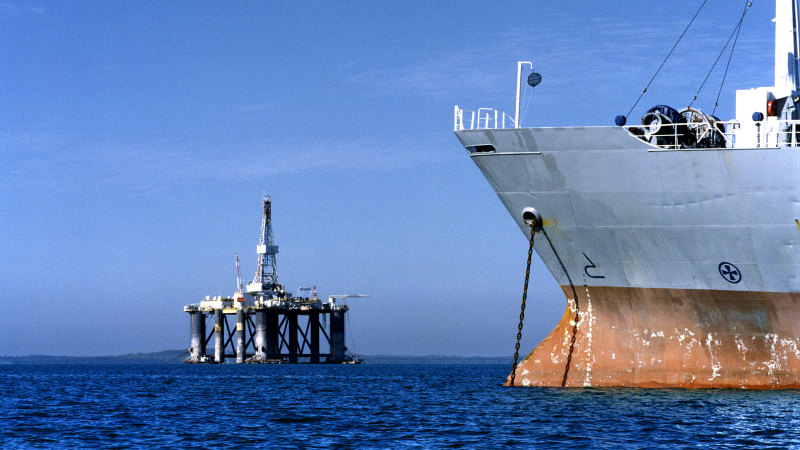Save articles for later
Add articles to your saved list and come back to them any time.
Oil and gas companies have gone from paying little tax to being among the biggest taxpayers in the country following the government’s successful legal fight against resource giant Chevron and a taskforce crackdown.
An Australian Taxation Office report shows that some oil and gas companies have started paying income tax, and ATO deputy commissioner Rebecca Saint said work by the office had meant more of those companies began paying corporate income tax sooner.
Earnings from Australian energy and mineral exports reached record highs of $467 billion in the last financial year.Credit: AP
“Following this report, tax payments from the oil and gas sector have increased to in excess of $11 billion for the 2023 year, with some of these companies currently some of the largest taxpayers in Australia,” she said.
“Even on a conservative estimate, around $4.4 billion of tax collections in the 2023 year was directly due to the ATO’s earlier interventions in the oil and gas sector.”
The federal government this year delivered the first surplus in 15 years thanks in large part to higher commodity prices, which helped boost the company tax take to $12.7 billion for the 2022-23 financial year.
Earnings from Australian energy and mineral exports reached record highs of $467 billion in the past financial year, as Russia’s invasion of Ukraine continued to impact global energy prices and drove up commodity prices.
Higher prices also effectively doubled the amount of petroleum resource rent tax collected in 2021-22 to nearly $2 billion, according to the ATO’s latest corporate tax transparency report. Saint said a crackdown on arrangements known as related party finance also helped increase the taxes paid by oil and gas.
Related party finance is where the local entity of a multinational firm borrows funds from an offshore counterpart which sets artificially high interest rates, which in turn lets the Australian branch claim higher tax deductions.
“It’s a mechanism that can be used by multinationals to decrease the tax payable in Australia, and it’s quite a common one,” Saint said. Some of those companies were able to start paying tax in the past two years after they recouped considerable start-up costs over several years.
In 2017, Chevron Australia abandoned an appeal against the ATO after the Federal Court ruled that Chevron’s local arm should not be able to claim interest on funds borrowed from the larger Chevron Group as if it was a standalone company.
Saint said the ATO’s tax avoidance taskforce had been able to use the momentum from that case to address similar tax schemes used by other oil and gas companies, wiping out the sector’s excess interest deductions.
“Overall, we estimate that we’ve removed about $40 billion in past and future interest deductions out of the corporate tax system, which obviously has significant flow-on implications for tax collections,” she said.
In the 2020-21 financial year, several oil and gas companies paid little or no corporate income tax.
Oil company Chevron, which reported total revenue of $9.2 billion, paid just $30 in tax. Chevron published its own tax transparency report, explaining that the company should have paid nothing because it still had $1.8 billion in losses that financial year.
Other companies that reported no taxable income that financial year despite large revenues included Ampol ($20 billion in revenue), BP Regional ($17.4 billion) and Viva Energy Group, which owns Shell-branded petrol stations ($12.8 billion).
Cut through the noise of federal politics with news, views and expert analysis. Subscribers can sign up to our weekly Inside Politics newsletter.
Most Viewed in Politics
From our partners
Source: Read Full Article

